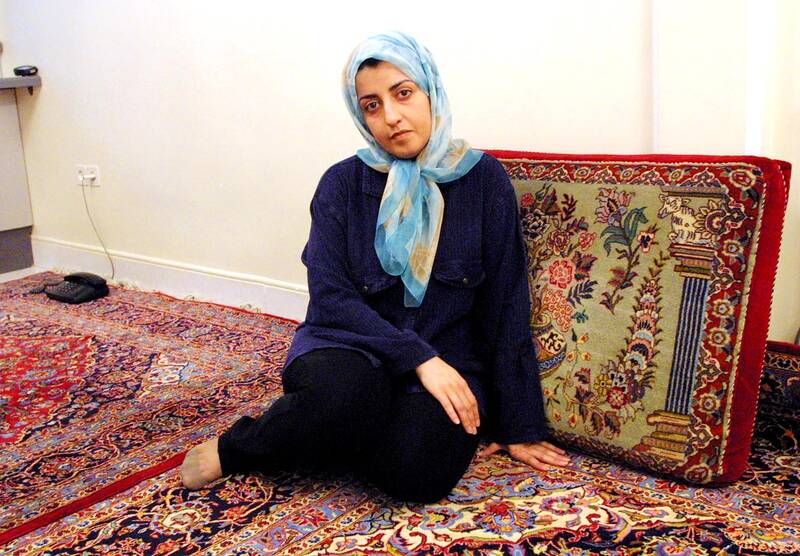The UN announced Tuesday night that its premier prize for press freedom has been awarded to three imprisoned Iranian female journalists “for their commitment to truth and accountability.”
The winners are Niloufar Hamedi who broke the news that 22-year-old Mahsa Amini died last September while being held by the morality police for wearing her headscarf too loosely, and Elaheh Mohammadi who wrote about her funeral.
Amini’s death touched off months-long protests in dozens of cities across Iran. The demonstrations posed one of the most serious challenges to the Islamic Republic since the 2009 Green Movement protests drew millions to the streets.

photo: AFP
The third winner is Narges Mohammadi, who has worked for many years as a journalist and is one of Iran’s most prominent activists.
The UN Educational Scientific and Cultural Organization World Press Freedom Prize is named for Guillermo Cano, a Colombian journalism who was assassinated in front of the offices of his newspaper El Espectador in Bogota on Dec. 17, 1986. UNESCO has awarded the prize to coincide with World Press Freedom Day on May 3 since 1997.
UNESCO Director General Audrey Azoulay announced the winners at a ceremony in New York, saying: “Now more than ever, it is important to pay tribute to all women journalists who are prevented from doing their jobs and who face threats and attacks on their personal safety.”

photo: AFP
Zainab Salbi, chair of the international jury of media professionals that chose the winners, said the brave work of the three winners “led to a historical women-led revolution.”
“They paid a hefty price for their commitment to report on and convey the truth,” Salbi said. “And for that, we are committed to honoring them and ensuring their voices will continue to echo worldwide until they are safe and free.”
In late April, Iran’s judiciary acknowledged that two reporters who broke news on Amini’s death, Hamedi and Elaheh Mohammadi, had been indicted on charges of collaborating with the US, acting against national security, and creating “propaganda against the system.”
While nearly 100 journalists have been arrested amid the demonstrations, Hamedi and Elaheh Mohammadi’s reporting was crucial in the days after Amini’s death to spread word about the anger that followed. Hamedi works for the reformist newspaper Shargh, while Mohammadi works for the reformist newspaper Ham-Mihan.
Their detentions have sparked international criticism over the bloody security force crackdown that lasted months after Amini’s death. According to UNESCO, both Hamedi and Mohammadi have been in Iran’s Evin Prison since September, and Hamedi has been in solitary confinement.
Since the protests began, at least 529 people have been killed in demonstrations, according to human rights activists in Iran. Over 19,700 others have been detained by authorities amid a violent crackdown trying to suppress the dissent. Iran for months has not offered any overall casualty figures, while acknowledging tens of thousands had been detained.
Narges Mohammadi has been repeatedly detained and imprisoned by authorities, and UNESCO said she is currently serving a 16-year prison sentence in Evin Prison. She’s won recognition abroad for her work, including her activism against the death penalty in Iran, which remains one of the world’s top executioners.
UNESCO said she is vice director of the Tehran-based civil society organization, Defenders of Human Rights Center. She also continues to report in print from prison and has interviewed other women prisoners which were included in her book White Torture,” the UN agency said.

In the March 9 edition of the Taipei Times a piece by Ninon Godefroy ran with the headine “The quiet, gentle rhythm of Taiwan.” It started with the line “Taiwan is a small, humble place. There is no Eiffel Tower, no pyramids — no singular attraction that draws the world’s attention.” I laughed out loud at that. This was out of no disrespect for the author or the piece, which made some interesting analogies and good points about how both Din Tai Fung’s and Taiwan Semiconductor Manufacturing Co’s (TSMC, 台積電) meticulous attention to detail and quality are not quite up to

April 21 to April 27 Hsieh Er’s (謝娥) political fortunes were rising fast after she got out of jail and joined the Chinese Nationalist Party (KMT) in December 1945. Not only did she hold key positions in various committees, she was elected the only woman on the Taipei City Council and headed to Nanjing in 1946 as the sole Taiwanese female representative to the National Constituent Assembly. With the support of first lady Soong May-ling (宋美齡), she started the Taipei Women’s Association and Taiwan Provincial Women’s Association, where she

Chinese Nationalist Party (KMT) Chairman Eric Chu (朱立倫) hatched a bold plan to charge forward and seize the initiative when he held a protest in front of the Taipei City Prosecutors’ Office. Though risky, because illegal, its success would help tackle at least six problems facing both himself and the KMT. What he did not see coming was Taipei Mayor Chiang Wan-an (將萬安) tripping him up out of the gate. In spite of Chu being the most consequential and successful KMT chairman since the early 2010s — arguably saving the party from financial ruin and restoring its electoral viability —

It is one of the more remarkable facts of Taiwan history that it was never occupied or claimed by any of the numerous kingdoms of southern China — Han or otherwise — that lay just across the water from it. None of their brilliant ministers ever discovered that Taiwan was a “core interest” of the state whose annexation was “inevitable.” As Paul Kua notes in an excellent monograph laying out how the Portuguese gave Taiwan the name “Formosa,” the first Europeans to express an interest in occupying Taiwan were the Spanish. Tonio Andrade in his seminal work, How Taiwan Became Chinese,